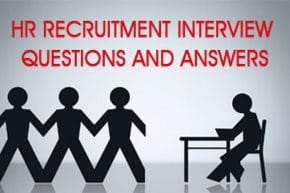HR Recruitment Interview Questions and Answers

A human Resources Recruiter is responsible for recruitment success in an organization. A recruiter plays a critical role in hiring the best possible talent in the organization. The key tasks of a HR Recruiter includes developing and executing recruiting plans, maintaining network through industry contacts, association memberships, trade groups and employees, coordinate and implement recruiting initiatives and is responsible for administrative duties and recordkeeping. Below are the most frequently asked HR Recruitment interview questions and answers. However, you should be prepared with other questions as well.
1 Q: Say something about yourself.
A: This question is a very basic question that comes up almost all the time in interviews. Describe about your educational and employment experience in a few sentences. Do not include any irrelevant personal information when answering this question. Answer this question truthfully and in brief. Also, try to relate yourself with the job you are interviewing for so as to be considered as a good fit for the organization.
2 Q: Why are you interested in working in this company?
A: In preparation for this answer, knowing about the company and doing some research beforehand is necessary. It is a great opportunity to focus on a fact about the company that is of particular interest. Include your skills and experience along with this fact in your answer. As a candidate for HR recruiter, you should have interest in the dynamics of the company. However, whatever you say it should also reflect contribution towards the company apart from your own interest.
3 Q:. Describe recruitment and selection process.
A: Recruitment is the process of identifying that the organization needs to employ someone up to the point at which application forms for the post have arrived at the organization. Selection then consists of the processes involved in choosing from applicants a suitable candidate to fill a post. The first step in a recruitment and selection process includes sourcing candidates which can be done through advertising, career sites etc. The next step involves reviewing the resumes after which a phone interview is conducted. A face to face interview is then scheduled and a suitable candidate is selected.
4 Q: What do you mean by Job Analysis?
A: Job Analysis is a process to identify and determine in detail the particular job duties and requirements and the relative importance of these duties for a given job. Job Analysis is a process where judgements are made about data collected on a job. The purpose of Job Analysis is to establish and document the job relatedness of employment procedures such as training, selection, compensation and performance appraisal.
5 Q: How will you rate your interpersonal skills?
A: Interpersonal skills relate to your ability to work with others. They help you focus on recognizing other’s individuality, communicating effectively, and working as a team member, mediating differences and listening to others. You need to give an honest answer to this question. Do not underrate or overrate yourself.
6 Q: What is the difference between staffing and recruiting?
A: Staffing and recruiting are two extremely important functions of any human resources department. Staffing starts from the entry of the individual to an organization and continues through all stages until his or her exit from the company. However, recruitment is done at the initial stage of staffing. Recruitment refers to the process of attracting, screening, and selecting qualified people for a job at an organization.
7 Q:. Why should we hire you?
A: The interviewer wants to find out what sets you apart from other candidates. It is better to give an answer on the basis of the flow of the interview. Listen to what the interviewer is saying about what are they looking for and answer accordingly. Be relevant and honest in your answer. Describe the skills you possess which are required for the job and show how you will be the best fit for the organization.
8 Q:. What are your strengths and weakness?
A: The interviewer through this question wants to know what skills, talents and employee you possess. Through this question, he will be able to say whether you will make a great candidate as an addition to the team. The strengths you mention should relate to the position you are interviewing for. You need to give examples of your strengths. While answering about your weakness avoid being negative instead be positive and give an honest answer. The weaknesses you mention should not be directly related to the job. Also mention what steps you are taking to overcome your weakness.
9 Q:. What employee recruitment, selection and development strategies have you used in your previous job?
A: The interviewer wants to test you whether you are fully aware of the different employee recruitment, selection and development strategies. Always remember that HR activities need to be aligned with organizational priorities and employee needs. This includes understanding the overall business strategy, conducting a SWOT analysis, determining key employee issues and developing an action plan.
10 Q: Do you keep HR policies and procedures current in terms of new legislation and regulations?
A: It is important for an HR recruiter to have the ability to understand new legislation and regulations and to introduce changes accordingly. For keeping yourself updated with the new legislations and regulations an HR recruiter needs to attend seminars, subscribe to journals and newsletters etc. You need to give an honest answer to this question.
11 Q:. What do you think are the main challenges facing Human Resources Management today?
A: You need to be aware of the current HR trends so as to answer this question. There are various challenges in Human Resources Management. An HR recruiter should be aware of the challenges facing Human Resources Management. Highlight the important issues and give your opinion of what you think about it. Keep your answer brief and to the point.
